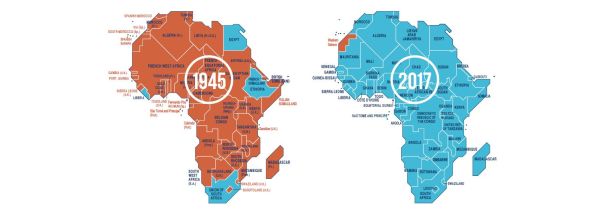Morocco's P for Politics in Africa

Morocco has started using its phosphate resources to expand influence on the African continent. The phosphate rock could have been central in the country’s accession to the African Union.
Published 24 March 2017
This week, the Peace and Security Council of the African Union urged Morocco "not to enter into contracts for the exploration and exploitation of Western Sahara’s natural resources". Morocco, critizised for by the council for not showing up at the Western Sahara meeting, accessed the union in January 2017.
But how did Morocco become part of the union, as the last country in Africa? Part of the explanation might be in the new phosphate diplomacy.
While Morocco aims to become the world’s largest producer in phosphate-based fertilizers - reaching a production of 12 million tonnes by 2017 - the country has also wanted to expand its political influence in Africa, where many countries recognize Western Sahara as an independent nation.
OCP Africa was established in 2016, and according to publications in the Moroccan Official Journal, almost overnight set up subsidiaries in 14 African countries “with a strong agricultural potential”. Some of these countries are staunch supporters of Saharawi self-determination. While employing a discourse rooted in the “development of Africa” and “feeding the planet”, OCP Africa aims to increase sales of the parent company in Africa fivefold by 2025. OCP at present generates 12% of its turnover in Africa, a continent with large regions with poor levels of the vital element phosphorous (P) in the soil.
The African Development Bank (AfDB) has committed to support OCP’s strategy south of the Sahara in July 2016, when AfDB’s president Akinwumi Adesina was in Morocco. AfDB had already lent US $250 million to OCP in 2012 for the construction of the African Fertilizer Center – a plant with capacity for one million tonnes of fertilizers. The center was inaugurated in 2016 in Jorf Lasfar, home to OCP’s gigantic industrial platform near Casablanca.
Among OCP's bigger plans is the construction of a giant fertilizer production plant in Ethiopia – a US $2.4 billion investment over five years, making it OCP’s biggest investment ever outside of Morocco. On 2 December 2016, OCP Group signed a deal with the Dangote Group – owned by and named after the richest man in Nigeria and Africa, Aliko Dangote – in the presence of Morocco’s king Mohammed VI and Nigerian President Muhammadu Buhari. OCP and Dangote have committed to an investment of US $2.5 billion to produce fertilizers in a town near Lagos, Nigeria.
Morocco has explicitly shown that it wishes to exchange phosphates to foreign government’s Western Sahara position, as seen in the case of Russia. So far, buying political goodwill with phosphate partnerships is mostly relevant for phosphates from Morocco – not Western Sahara.
Both Nigerian and Saharawi news sites had written that the Nigerian Dangote deal included use of phosphate rock from Western Sahara. However, this has not been confirmed by WSRW, and could be based on a misunderstanding. Most of the phosphate and fertilizer products sold from Morocco are indeed from mines and factories in Morocco proper.
That said, implicating new countries in the trade of phosphate rock from Morocco itself could be a first step in creating ties that later lead to plunder of Saharawi rock.
India froze the recognition of the republic of Western Sahara in the year 2000 at a time when the phosphate partnership between India and Morocco improved. Now, the Indian government is part owner in the joint-venture Paradeep Phosphates, together with OCP. In 2016, India had become the second biggest importer of phosphate rock from Western Sahara. Paradeep Phosphates took in a bulk vessel from the occupied territory as late as 19 March 2017. The vessel, Norwegian flagged Spar Lyra, owned by the company Spar Shipping, left Paradip port on 23 March 2017.
In the end, the phosphate does not always lead to diplomatic change. For instance, the Venezuelan government is both defending the Western Sahara issue in the UN, while at the same time being an important purchaser of the mineral, both into Venezuela and to Colombia. Playing on both horses, the Venezuelan government has been a key financier of the occupation for several decades. In 2016, the imports to Venezuela of rock from occupied Western Sahara was around 14,5 million dollars, corresponding to almost a half of all multilateral humanitarian aid given to the Saharawi refugee camps every year. Venezuela has always been the only government in the world taking part in this trade. From last year a new government entered into the trade - the one of India.
The UN Food and Agriculture Organisation (FAO) considers that 64% of the world’s land available for agriculture is in Africa, where the population is expected to double by 2050. At present, the continent’s agricultural yields are too low. But FAO experts point out that natural fertilizers made from compost or organic fertilizers, combined with conservation agriculture, are equally effective at raising crop yield in Africa – without the potential hazards posed by chemical fertilizers.
News
These are the clients of Morocco’s phosphate plunder
For the eleventh year in a row, Western Sahara Resource Watch publishes a detailed, annual overview of the companies involved in the purchase of conflict phosphates from occupied Western Sahara.
22 May 2024
Germany thumbs down OCP credit in Western Sahara
Germany's state-owned development bank will not finance projects in Western Sahara.
13 May 2020
What is Continental negotiating with OCP?
As Continental renegotiates its contract with Morocco's national phosphate company, it is still not clear whether the German group intends to limit its operations to Morocco proper or extend them into occupied Western Sahara.
26 March 2020
New report: Western Sahara phosphate trade halved
The export of phosphate rock from occupied Western Sahara has never been lower than in 2019. This is revealed in the new WSRW report P for Plunder, published today.
24 February 2020



